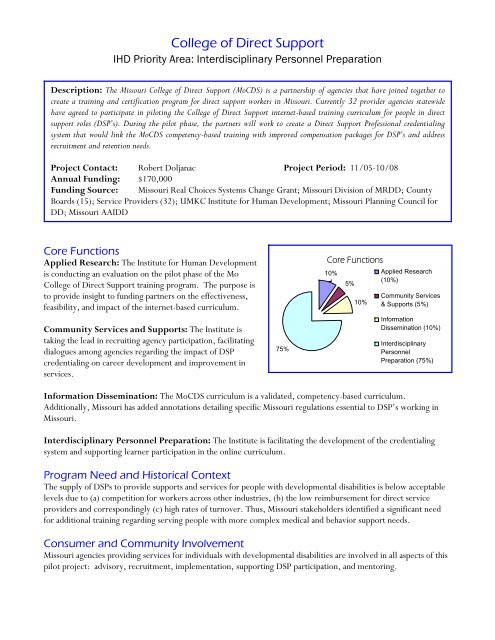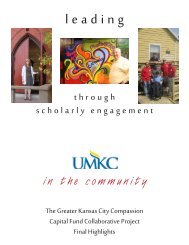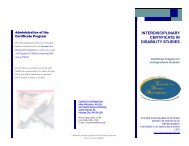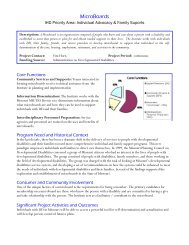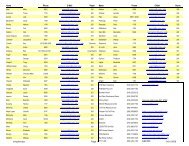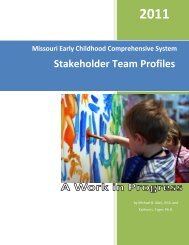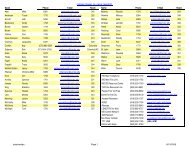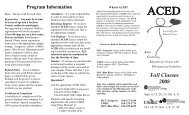College of Direct Support - UMKC Institute for Human Development
College of Direct Support - UMKC Institute for Human Development
College of Direct Support - UMKC Institute for Human Development
Create successful ePaper yourself
Turn your PDF publications into a flip-book with our unique Google optimized e-Paper software.
<strong>College</strong> <strong>of</strong> <strong>Direct</strong> <strong>Support</strong><br />
IHD Priority Area: Interdisciplinary Personnel Preparation<br />
Description: The Missouri <strong>College</strong> <strong>of</strong> <strong>Direct</strong> <strong>Support</strong> (MoCDS) is a partnership <strong>of</strong> agencies that have joined together to<br />
create a training and certification program <strong>for</strong> direct support workers in Missouri. Currently 32 provider agencies statewide<br />
have agreed to participate in piloting the <strong>College</strong> <strong>of</strong> <strong>Direct</strong> <strong>Support</strong> internet-based training curriculum <strong>for</strong> people in direct<br />
support roles (DSP’s). During the pilot phase, the partners will work to create a <strong>Direct</strong> <strong>Support</strong> Pr<strong>of</strong>essional credentialing<br />
system that would link the MoCDS competency-based training with improved compensation packages <strong>for</strong> DSP’s and address<br />
recruitment and retention needs.<br />
Project Contact: Robert Doljanac Project Period: 11/05-10/08<br />
Annual Funding: $170,000<br />
Funding Source: Missouri Real Choices Systems Change Grant; Missouri Division <strong>of</strong> MRDD; County<br />
Boards (15); Service Providers (32); <strong>UMKC</strong> <strong>Institute</strong> <strong>for</strong> <strong>Human</strong> <strong>Development</strong>; Missouri Planning Council <strong>for</strong><br />
DD; Missouri AAIDD<br />
Core Functions<br />
Applied Research: The <strong>Institute</strong> <strong>for</strong> <strong>Human</strong> <strong>Development</strong><br />
is conducting an evaluation on the pilot phase <strong>of</strong> the Mo<br />
<strong>College</strong> <strong>of</strong> <strong>Direct</strong> <strong>Support</strong> training program. The purpose is<br />
to provide insight to funding partners on the effectiveness,<br />
feasibility, and impact <strong>of</strong> the internet-based curriculum.<br />
Community Services and <strong>Support</strong>s: The <strong>Institute</strong> is<br />
taking the lead in recruiting agency participation, facilitating<br />
dialogues among agencies regarding the impact <strong>of</strong> DSP<br />
credentialing on career development and improvement in<br />
services.<br />
75%<br />
Core Functions<br />
10% Applied Research<br />
(10%)<br />
5%<br />
10%<br />
Community Services<br />
& <strong>Support</strong>s (5%)<br />
In<strong>for</strong>mation<br />
Dissemination (10%)<br />
Interdisciplinary<br />
Personnel<br />
Preparation (75%)<br />
In<strong>for</strong>mation Dissemination: The MoCDS curriculum is a validated, competency-based curriculum.<br />
Additionally, Missouri has added annotations detailing specific Missouri regulations essential to DSP’s working in<br />
Missouri.<br />
Interdisciplinary Personnel Preparation: The <strong>Institute</strong> is facilitating the development <strong>of</strong> the credentialing<br />
system and supporting learner participation in the online curriculum.<br />
Program Need and Historical Context<br />
The supply <strong>of</strong> DSPs to provide supports and services <strong>for</strong> people with developmental disabilities is below acceptable<br />
levels due to (a) competition <strong>for</strong> workers across other industries, (b) the low reimbursement <strong>for</strong> direct service<br />
providers and correspondingly (c) high rates <strong>of</strong> turnover. Thus, Missouri stakeholders identified a significant need<br />
<strong>for</strong> additional training regarding serving people with more complex medical and behavior support needs.<br />
Consumer and Community Involvement<br />
Missouri agencies providing services <strong>for</strong> individuals with developmental disabilities are involved in all aspects <strong>of</strong> this<br />
pilot project: advisory, recruitment, implementation, supporting DSP participation, and mentoring.
Significant Project Activities and Outcomes<br />
• Improvement in the knowledge, skills, and competencies <strong>of</strong> DSPs<br />
• Improvement in the retention rate <strong>of</strong> DSPs<br />
• Long-term career development <strong>for</strong> DSPs, including a career ladder<br />
• <strong>Development</strong> <strong>of</strong> a statewide credentialing and certification process<br />
• Establishment <strong>of</strong> a plan <strong>for</strong> long-term sustainability<br />
• Ultimately, an improvement in the quality <strong>of</strong> life experienced by people<br />
with developmental disabilities<br />
<strong>Institute</strong>’s Role<br />
• Evaluation <strong>of</strong> pilot outcomes<br />
• Leadership in development <strong>of</strong> a DSP credentialing system and CEU’s<br />
• <strong>Development</strong> <strong>of</strong> companion <strong>UMKC</strong> courses <strong>for</strong> college credit and CEU’s<br />
• Coordination <strong>of</strong> recruitment and mentoring<br />
• <strong>Support</strong> DSP participation<br />
Products<br />
• DSP certificate <strong>of</strong> completion<br />
• DSP credential<br />
• DSP college courses<br />
• Missouri annotations to the MoCDS curriculum<br />
Impact<br />
System: A statewide recognized<br />
DSP credential will support DSP<br />
career development.<br />
Personnel: <strong>Direct</strong> <strong>Support</strong><br />
Pr<strong>of</strong>essional increase knowledge<br />
and skills essential <strong>for</strong> providing<br />
quality care <strong>for</strong> individuals with<br />
disabilities.<br />
Leveraging: A collaborative<br />
comprised <strong>of</strong> the <strong>Institute</strong>, Missouri<br />
agencies, and state departments,<br />
have supplemented the federal CMS<br />
grant with contributions <strong>of</strong><br />
funding, both direct and indirect,<br />
to this pilot project.


